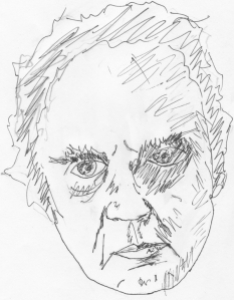So…I may have been talking tongue in cheek for much of my Caffeine Therapy article, but I was serious as a heart attack, and we all know how serious those Widow Makers are, when talking about the positive impact that caffeine has had on my mental state of mind. Before I started drinking coffee I never knew where I was going to be mood-wise. Some days I would wake up Dr. Jekyll, some days Mr. Hyde. It was very stressful. After I started drinking coffee again, or, more specifically, after I added caffeine to my diet again, life was much more normal, predictable, and pleasant for me…and the rest of the family. While I still get stressed out and tense relatively easily, even while caffeinated up, it isn’t nearly has bad as it would get while I was caffeine-free.
Consequently, when I visited the doctor for a checkup from the neck up…and down…this past Thursday, I was looking forward to finding out how adding caffeine to my diet has impacted my liver, since that is where it’s metabolized.
Well, the lab results showed that my liver component counts were pretty high. Here are the numbers (Read: Component, Low Range, High Range, Range Units, My Lab Results):
DIRECT BILIRUBIN, 0.0, 0.4, mg/dl, 0.3
ALKALINE PHOSPHATASE, 30, 120, U/L, 173
ASPARTATE AMINO TRAN, 0, 37, U/L, 100
ALANINE AMINO TRANS, 0, 40, U/L, 263
Now, I have no idea what all of these different components are, but I do know the docs look at them to determine how my liver is doing. I asked my oncologist if he thought I should stop drinking coffee because the counts are so high and he said no. He wasn’t worried about the impact of caffeine on the liver. In fact, he agreed with my assessment that it is probably the caffeine that is positively stimulating me mentally while suppressing the negative psychological impact of all the other drugs and stress from my inflictions.
He was, however, worried that the high counts indicated that Graft Versus Host Disease was flaring up in my liver. After examination, he also assessed that it was flaring up again in my skin and eyes. He wanted to take some “preemptive measures” (his words) by either raising my steroid dosage or by trying another drug called Cyclosporin. But the way things work with my care and treatment, it wasn’t his call. All decisions relating to my care that involve GVHD are made by a different oncologist, one who also is a nationally renowned GVHD specialist and he was not quite as concerned about the elevated numbers as the other oncologists on Team Kurt. In fact, the wife and I had lobbied the GVHD specialist to raise my steroid dosage the last time we saw him over a month ago. I could tell even then by the way that I had been feeling and how my skin had looked that the GVHD was flaring up. But the specialist’s primary concern is with the GVHD in my lungs and not so much with the GVHD anywhere else. According to him, the other areas are relatively minor concerns compared to the lungs and were no cause for alarm or any additional action. A month later he apparently still feels the same.
I’m guessing the GVHD doc wants me to focus on my upcoming week-long visit in April to the National Institute of Health where I will participate in a study to get FDA approval for a new Lung GVHD treatment.
Still, the other oncologist wants me and the wife back next Thursday so we all, to include the GVHD specialist, can get together and further discuss this GVHD flare up in the liver and elsewhere.
Until then.







